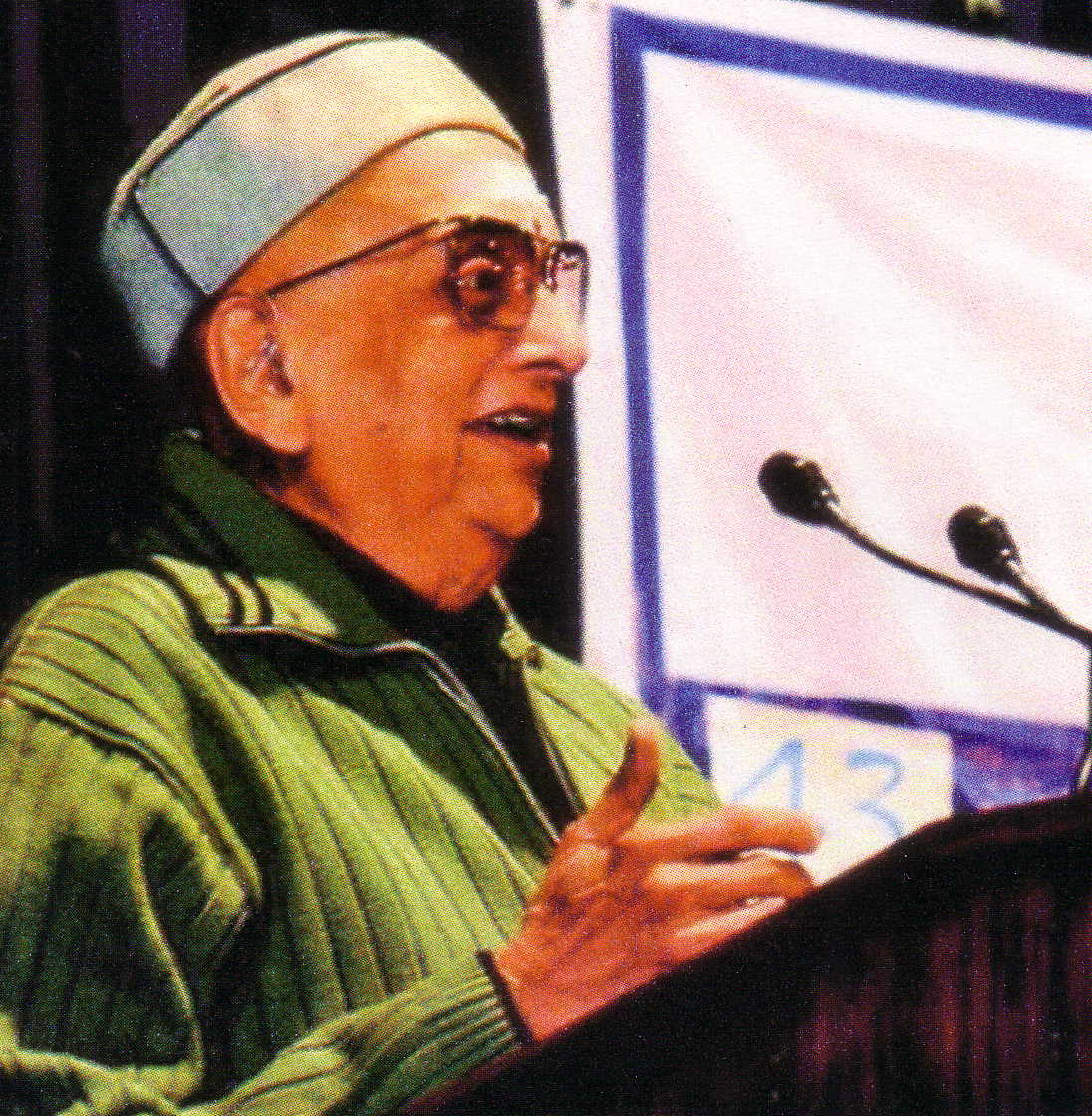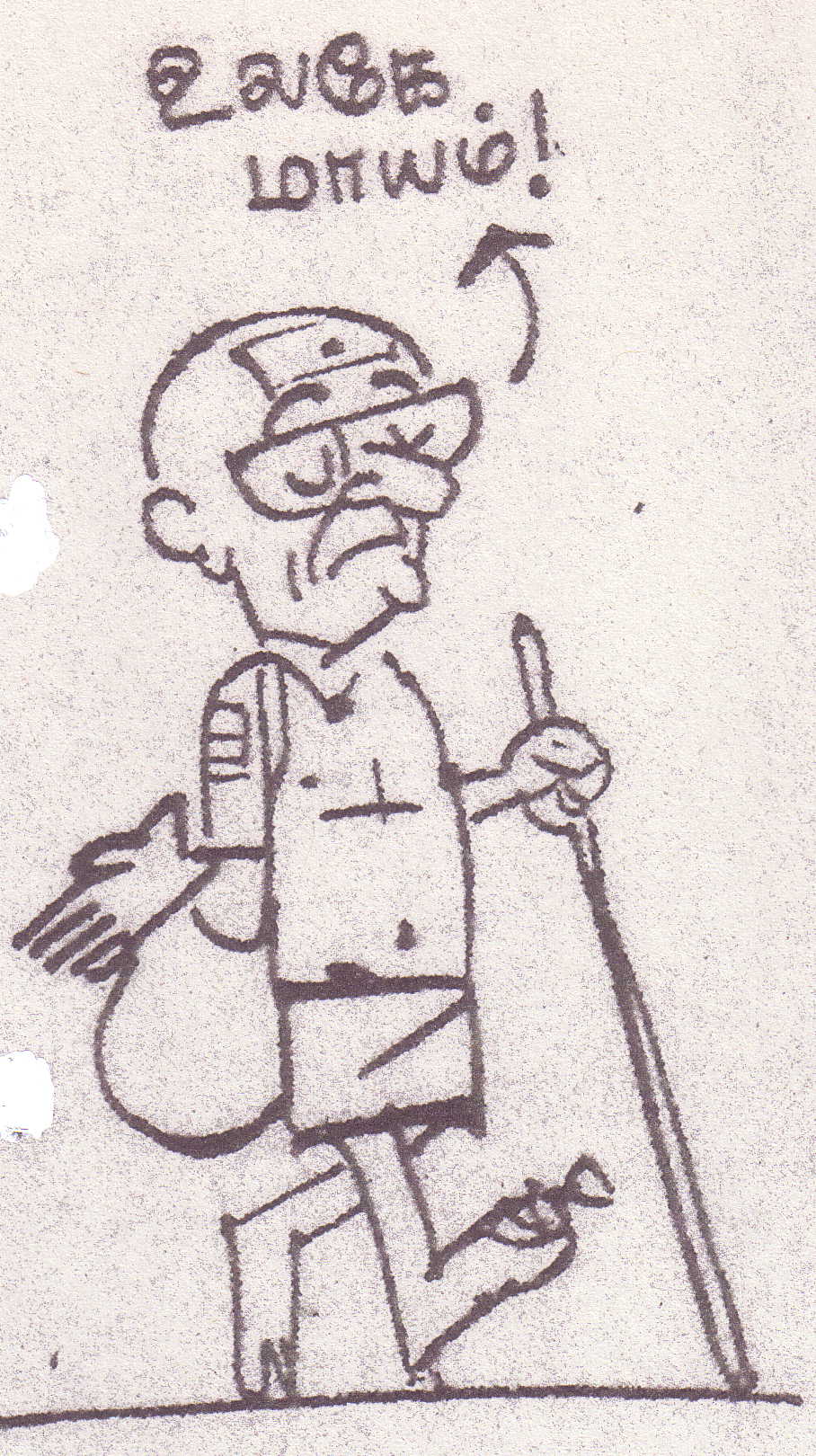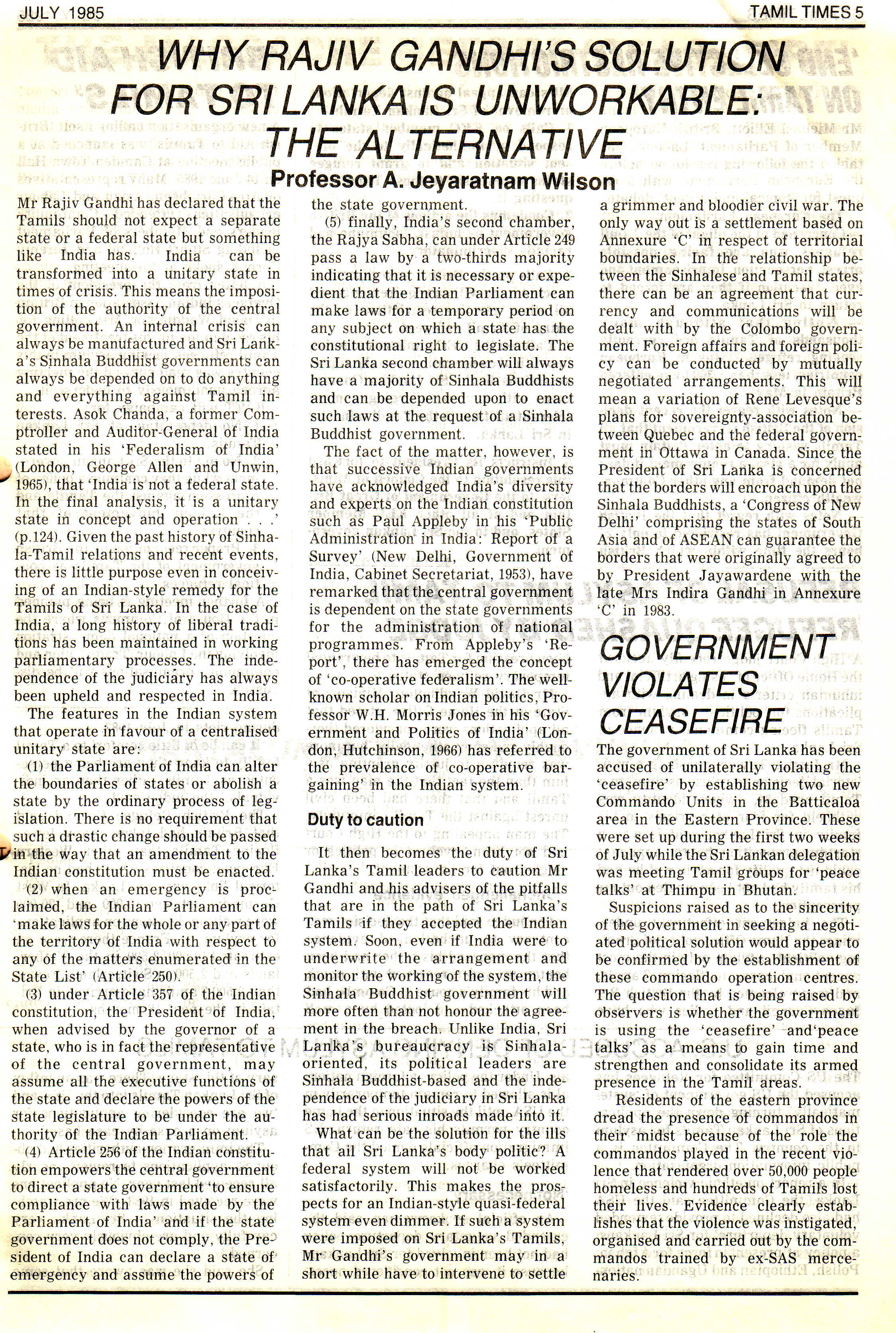by Sachi Sri Kantha, October 2, 2013
 Twelve years have passed since I began writing to the Sangam website. In these 12 years, though I have chronicled the careers of quite a number of famous and infamous, popular and unpopular Tamilians from Eelam and Tamil Nadu, I never touched on one so far, except passingly on one occasion. It is that of Srinivasan Ramaswamy (b 1934), aka Cho Ramaswamy from Chennai. On that occasion too (a commentary on fools, entitled ‘Scholarship on Fools: Inspiration from Orrin Klapp and poet Kannadasan, May 9, 2005), it was merely mentioning him as an example of a ‘Comic Rogue’; one among the ten types of fools in Klapp’s classification. Cho also served one term as a nominated MP at the Rajya Sabha (Upper House) in Indian parliament from 1999 to 2005. Lately, I have noticed in the net that Cho has been praised as ‘a genius’ among living Tamils by his acolytes – for his contributions to legal arena, drama, movies, journalism, social (and political) commentaries and humor. ‘Is Cho – a genius?’ should be a joke in its own merits!
Twelve years have passed since I began writing to the Sangam website. In these 12 years, though I have chronicled the careers of quite a number of famous and infamous, popular and unpopular Tamilians from Eelam and Tamil Nadu, I never touched on one so far, except passingly on one occasion. It is that of Srinivasan Ramaswamy (b 1934), aka Cho Ramaswamy from Chennai. On that occasion too (a commentary on fools, entitled ‘Scholarship on Fools: Inspiration from Orrin Klapp and poet Kannadasan, May 9, 2005), it was merely mentioning him as an example of a ‘Comic Rogue’; one among the ten types of fools in Klapp’s classification. Cho also served one term as a nominated MP at the Rajya Sabha (Upper House) in Indian parliament from 1999 to 2005. Lately, I have noticed in the net that Cho has been praised as ‘a genius’ among living Tamils by his acolytes – for his contributions to legal arena, drama, movies, journalism, social (and political) commentaries and humor. ‘Is Cho – a genius?’ should be a joke in its own merits!
I was a fan of Cho (the humorist and quasi-journalist) during late 1970s and up to 1983. When I was in Sri Lanka, I used to buy his Thuglak magazine at the newsstand for his brand of humor on Indira Gandhi, Karunanidhi and MGR. He had developed a subtle style of pricking something serious – with self-deprecatory comments. One of the popular features of his magazine was the ‘question and answer’ column. Cho would attack all politicians left to right, and then use a self-deprecating, loony and nonsensical quip (occasionally accompanied with a cartoon) as a punch line. An example is shown in the attached cartoon, where Cho is depicted as a sage on a pilgrimage with a stick and a sack, pouting ‘Ulahe Mayam! [World is an illusion]. The two word caption is from an old popular song beginning with the same words ‘Ulahe Mayam – Vaazhve Mayam’ [World is an illusion – Life is an illusion] from the popular Devadass (1953) movie, where the alcoholic hero sings about what he sees in his mileau.
But, my appreciation of Cho (the political commentator) waned when he gained recognition as one of the Tamil Nadu journalists, who vigorously opposed the activities of Liberation Tigers of Tamil Eelam (LTTE). Even now, I do not deny the fact that he is a talented humorist. That’s why my title says, ‘A Jack of All Trades and Master of One’. To a limited extent, Cho’s career can be compared to that of London-born Peter Ustinov (1921-2004), a reputed stage and movie actor, author, humorist. But, Ustinov had class, which Cho is devoid of. Someone has to say it straight, and let it be me. Cho’s knowledge on Eelam Tamil affairs is gibberish.
Lately, I have watched in Youtube a few of his January ‘anniversary’ celebration events on the establishment of his journal Thuglak. Specifically, I watched the posted Youtube versions of 2008, 2012 and 2013. A notable component of this celebration event was Cho answering questions from Thuglak readers. Invariably, one reader would ask him a question relating to the status of Sri Lankan Tamils. Cho’s stock answer, was that the 1987 Accord of Rajiv Gandhi and Jayewardene was the manna for Sri Lankan Tamils, and Tigers spoilt it by attacking the Indian Peace Keeping Forces (IPKF), and Rajiv Gandhi had to die because of that.
Either Cho is completely ignorant of what happened in 1987-1990 in Sri Lanka, or he is pretending not to know the real facts. Here are my ‘anti-Cho’ arguments.
First, as I have written previously in this site, the 1987 Accord fell through, not because of LTTE opposing the Indian army. Rajiv Gandhi, his dumb advisors and the RAW misjudged the opposition to this accord from various constituencies of Sri Lanka. The then opposition party (SLFP) opposed it. The Southern terrorists (JVP) opposed it. The Buddhist Bhikkus opposed it. Even within the ruling UNP party, prominent leaders like the then Prime Minister Premadasa and Lalith Athulathmudali opposed it. All these constituencies were from the Sinhalese themselves.
Secondly, Cho completely ignores the duplicitous role played by RAW in not promoting a unified Tamil militant force to tackle the Sinhalese army.
Thirdly, Cho also completely ignores the fact that the composition of Sinhalese army is >99% Sinhalese since 1962 and this was the prime reason for the origin of LTTE. The 1987 Accord of Rajiv Gandhi and Jayewardene was silent on this sensitive issue.
Fourthly, one would think that Cho should have read, at least the memoir of J.N. Dixit, ‘Assignment Colombo’ (1998); because, he took a lead role in promoting the 1987 Accord. In this memoir, Dixit had provided at least nine reasons for the failure of the 1987 Accord, in chapter 19 ‘Rights and Wrongs – Why did India Fail?’ And LTTE was not responsible for all of the reasons. Last but not the least, Cho is a clod when it comes to military culture (values, attitudes and beliefs) and military operations. While even Indian military men who fought with LTTE had paid tributes to Prabhakaran’s ingenuity, what qualifications Cho has to critique LTTE’s deeds?
Dixit’s Nine Reasons
To disprove Cho’s repeated faulting of LTTE for the breakdown of Rajiv-Jayewardene Accord of 1987, I provide Dixit’s reasons why it failed.
Reason 1: “ Intelligence agencies, armed forces and the Ministry of External Affairs, including myself told him (Rajiv Gandhi) that the initiatives being taken for signing the agreement were valid and practical….That the advice was wrong and the political judgement on which this advice was based was erroneous has to be acknowledged with the benefit of hindsight.”
Reason 2: “In fact, there were periods when the Indian defence establishment, the intelligence agencies and the Ministry of External Affairs were working at cross-purposes. The Sri Lankan operation is in glaringly negative contrast to the harmony, cohesiveness and coordination which characterized Indian policies related to the Bangladesh crisis in 1970-71.”
Reason 3: “In fact, Rajiv Gandhi’s expectation that once M.G. Ramachandran supported the agreement (which he did) he would have full cooperation from Tamil Nadu in implementing his policies in Sri Lanka proved to be wrong.”
Reason 4: “An over-arching miscalculation of India was our underestimating Prabhakaran’s passionate, even obsessive, commitment to the cause of Tamil Eelam, his authoritarian and single-minded nature, his tactical cleverness and his resilience in adversity.”
Reason 5: “I overestimated the sincerity and the political will of Jayewardene to come to a genuine compromise with the Tamils with the help of the Government of India.”
Reason 6: “I was convinced that the LTTE will not participate in any negotiated compromise. I, therefore, felt that India should deal with other Tamil groups bypassing the LTTE and isolating it. My assessment at that time was that if other Tamil groups join the Indian initative, the LTTE can be successfully isolated initially which would compel it to join the peace process. I was wrong in this assessment.”
Reason 7: “My expectation that the LTTE could be successfully isolated from Sri Lankan Tamils also proved to be wrong.”
Reason 8: “My assessment that Indian public opinion and political parties will rise above their apprehensions and interim difficulties and would be fully supportive of a comprehensively practical compromise, safeguarding Sri Lankan interests, Tamil aspirations and India’s regional security concerns. I was wrong in this anticipation.”
Reason 9: “My anticipation that once Jayewardene signs the agreement he will be decisive in neutralizing Premadasa and Lalith Athulathmudali and their policies against Tamils and the agreement, also proved to be wrong.”
To be fair by Dixit, unlike Cho Ramaswamy, he had not faulted Prabhakaran and LTTE for the lack of success for the Indian policy between 1987 and 1990. He only mentions about Prabhakaran’s passionate commitment to the Tamil Eelam idea and how Indians underestimated it. In translation, it reads that unlike other Tamil militant leaders ‘Prabhakaran could not be bought’.
Cho – a hypocrite
While listening to Cho’s speech at the January 2013 (43rd Anniversary of Thuglak) via Youtube, I could infer that he is also a hypocrite. On relating to the current political situation in India, he stated, that “India has become a ‘soft’ nation” and that’s why intrusion of China repeatedly occurs in Indian borders.” He also stated, that there is no point in ‘talking’. By inference, he wants India to be a ‘stronger’ nation militarily. Then, quoting a Hindu scripture (a sloga from Manu Smirthi) Cho asserted that punishment is needed for any crime, because a human fears punishment. Well, why then he contradicts his own view, when it comes to LTTE’s past deeds. LTTE wanted Eelam to be a stronger nation, based on the logic that ‘repeated talking’ won’t provide any manna for Tamils. LTTE also punished folks (Sinhalese, Tamils, Muslims and thousand-odd Indians) for their anti-social activities.
To make Cho and his anti-LTTE cohorts like writer T. Jayakanthan (if they bother to read), more information oriented, I provide a 1985 brief commentary by Prof. A. Jeyaratnam Wilson, on ‘Why Rajiv Gandhi’s solution for Sri Lanka is unworkable’, which appeared in the Tamil Times (London) of July 1985. Prof. Jeyaratnam Wilson’s 85th birthday falls on October 4.


Like N Ram, Visu, SV Sekar and Raman Cho wanted to harm Tamil people. They have one thing in common. They are Tamil Brahmins. It appears that that Tamil Brahmins hate their fellow Tamils. It is time we look at the reasons and see whether we can address the issues that caused the Tamil Brahmins to hate us.
Sachi managed to articulate his feelings about Cho very well. It touched my emotions. I am sure Sachi would have evoked an emotional response from many Tamils.
I was fan of Cho. I thought that he was a friend of Tamils and a very logical and reasonable man
I was shocked by his strident and quite illogical anti-Tamil propaganda. I not only felt betrayed by him but was also saddened by his cruelty.
I wish to thank Sachi for this article. It is needed for posterity.
Mr.Shan! u r 100% true:
Like CHO,every Poonool(bramin) is earning their Bread,butter&Jam from Tamilnadu, Tamil community.
….worse these POONOOL gang will always go against Tamil community…
Pity that still Tamil community praises these “Opportunists” as intelligent ones:
In the whoe world,Tamil community has the unique nature of killing themselves!
Thanks Dr. Sachi for this piece on Cho. I too got fooled by his charade till early 80s when his true colors emerged and I soon realized what a filthy character is he. His pretense of being a secular journalist got exposed when he accepted the nomination for MP from BJP. Now he openly supports Modi who committed genocide of Muslims. He is one of the Tamils who did maximum damage to the cause of Eelam only next to Subramanian Swamy. It is not a coincidence that both of them are in BJP camp now. Their livelihood depends on suppression of minorities at any cost to retain their supremacy.
There is NO comparison, not even a dot, between Ustinov and Cho Ramasamy.
Sachi Sri Kantha,
Recently Thuglak Reporter “Idhaya” along with others went to Srilanka to ascertain the status of Tamils and published series of articles in Thuglak. Now its also published as a book titled as “Thuglak in Srilanka”.
From the comments that have been posted by Sachi & all others, it is very clear that none of you have read those articles or the book. Please read this book first before blabbering utter nonsense about Thuglak and Cho.
Facebook link of the book “Thuglak in Srilanka”:
https://www.facebook.com/thuglakweb#!/photo.php?fbid=629189707131347&set=p.629189707131347&type=1&theater
As supremacist feeling Brahmins lost their mastership and prominence in Tamil Nadu in all spheres just due to their birth into an upper-caste (2% of total population) during the uprising of Tamils 80 years ago led by Periyaar, they could not take on Tamils competing in education and employment etc.
They lost everywhere except the media which they continue to hold on and influence (poison) the minds of Tamils to divide, various governments and policy makers/advisers.
These Tamil Brahmin media mafia always take stand against the aspirations of Tamils and Tamil Nadu governments.
Eezham cause is another one such suffering at the hands of media mafia run by Tamil Brahmins.
However, we can not castigate the entire Brahmin community as I have come across many wonderful human beings from it.